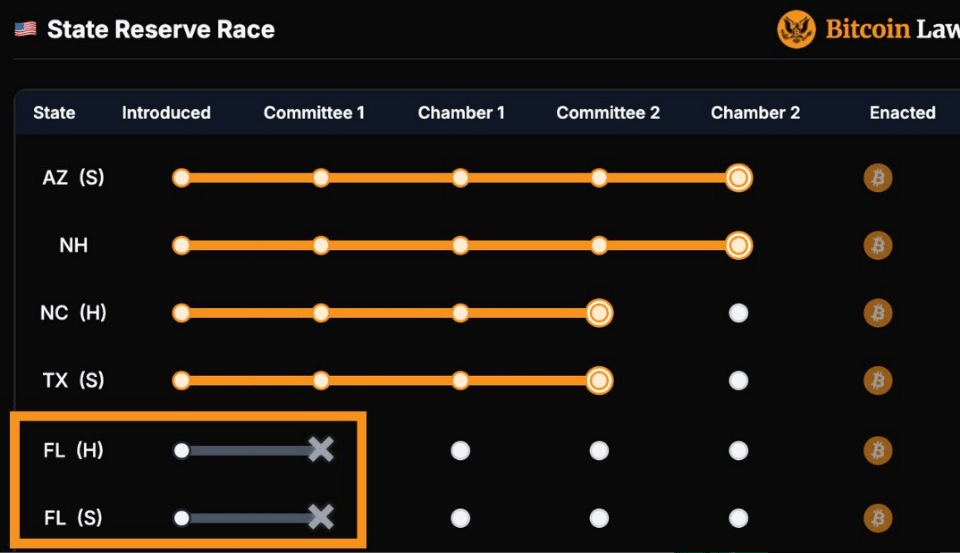Florida Slams Door on Bitcoin: State Kills Proposed Crypto Reserve Bills
Florida just axed its chance to become a crypto pioneer—state legislators shot down two bills that would’ve allowed Bitcoin as a reserve asset for government funds. So much for ’innovation-friendly’ policies.
The move comes as other states like Wyoming and Texas court blockchain businesses with tax breaks and regulatory sandboxes. Meanwhile, Florida’s old-guard finance crowd pops champagne—nothing disrupts their golf-course dealmaking like decentralized money.
Pro-crypto lawmakers vow to reintroduce the legislation, but for now, the Sunshine State’s treasury remains shackled to dollars. Because who needs 21st-century finance when you’ve got 1970s-era banking lobbyists calling the shots?
States Reject Crypto Reserve Legislation In Rapid Succession
The Florida effort’s collapse comes on the heels of similar failures in at least seven other states this year. Arizona, Oklahoma, South Dakota, Montana, North Dakota, Pennsylvania, and Wyoming all rejected or ditched Bitcoin treasury bills in recent months.
A few bills made it closer to the vote than anyone anticipated. In Arizona, a bill passed both the House and Senate before Governor Katie Hobbs vetoed it last week. Retirement funds, the governor said in her veto message, are “not the place to test unproven assets.”
Legislative Committee Votes Show Divided Opinion On Crypto Investment
The voting records in states show conflicting opinions regarding government Bitcoin reserves. Oklahoma’s legislation moved through one committee with wide support but was defeated 6-5 in the Senate Revenue and Taxation Committee on April 29.
Senator Christi Gillespie changed to supporting the legislation after hearing from constituents, but this was not enough to rescue it.
South Dakota legislators voted down their bill in a 9-3 committee vote last February. Montana’s House Bill 429 died on a full floor vote of 59-41 despite proponents presenting it as an easy means of diversifying investment risk. North Dakota’s bill suffered the same fate with a 57-32 rejection.
Wyoming’s push received NEAR zero support, with only one legislator voting for it. Pennsylvania’s bill never even left committee to receive a vote.
Most State Bitcoin Bills Now Dead Or StalledThe tide of rejection is a stark reversal from earlier this year. Just weeks ago, over 45 Bitcoin reserve bills had been filed in more than two dozen states.
According to data from Bitcoin reserve tracker Bitcoin Laws, that now stands at 36 active bills in 19 states.

Utah, which had been viewed by many as a leader in the movement early on, ultimately removed crucial provisions from its blockchain bill. The final version that passed eliminates the provision permitting the state treasurer to invest in digital assets.
Arizona has two more chances to be the first in the nation to establish a Bitcoin Reserve.
The most likely to pass (HB 2749) was authored by @JeffWeninger, and it offers a budget neutral method to fund the reserve using profit from the unclaimed property fund. @EleanorTerrett pic.twitter.com/yGlrz2saql
— Dennis Porter (@Dennis_Porter_) May 5, 2025
Texas And New Hampshire Lead Remaining Bitcoin EffortsOthers have tried a different tack. Arizona has a stand-alone bill (SB 1373) still pending the governor’s signature. This bill, unlike the vetoed one, targets custody, not direct investment, and could still become law.
As legislative calendars in the states close out, only Texas and New Hampshire appear to have tangible avenues forward with their Bitcoin reserve bills.
The legislatures in both states still push those bills while others along the way did not survive.
Featured image from Ai-CIO, chart from TradingView

